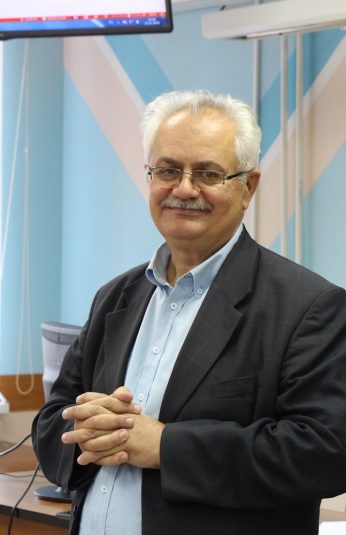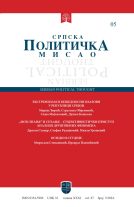- Home page
- Researchers
- Dr. Zoran Milošević, Deputy Director
Dr. Zoran Milošević, Deputy Director

- Address: /
- Email: zoran.milosevic@lux-dog.com
- Telephone: /
- LinkedIn: /
Resercher
Institute for Political Studies
2000
Faculty of Philosophy, University of East Sarajevo
PhD
2000
Faculty of Political Sciences, Zagreb University
MA
1987
Land Forces Military Academy
BS
1983
Dr. Zoran Milošević, Principal Research Fellow, is the Deputy Director and member of the Center for the Culture of Memory in the Institute for Political Studies. He published more than 1000 bibliographic items.
He deals with the sociology of religion, political sociology and geopolitics. Among the published monographs, "Social doctrine of the Roman Catholic Church", "From Malorus to Ukrainians: a contribution to the study of the change in the cultural and national identity of Malorus" (translated into Russian), "Turkey and neo-Ottomanism" and "Terrorists or victims of the West: the Muslim question in the European Union" " (Translated into Arabic and published in Iraq), "Geopolitics - View from the Balkans" (On russian).
In addition to the above, Milošević organized several international conferences and prepared proceedings from them. Here are some: "Holiness and identity: the role of saints and holiness in the formation of the identity of Orthodox peoples", "Holiness and the spirit of the times", History as an instrument of geopolitics", "Europe and the Danube - Danube in the geopolitical strategies of European states" and others.

SOCIAL SCIENCES AND NATIONAL SECURITY
The contribution of social sciences and humanities to the security of people, society and the state is a little studied topic. It goes without saying that every member of society, especially scientists, should contribute to security, primarily through the adoption of an adequate security culture, knowledge and will (to defend the state) that they possess, which presupposes their knowledge of the legal frameworks that regulate this field. The problem of the contribution of social sciences and humanities to national security arose due to uncritical reforms of these fields initiated by Western power centres. The evaluation of scientific works and the actions of scientists is extremely important for the state and requires an organized system, otherwise it can be a significant source of endangering national security. In this paper, the authors analyse the importance attached to social sciences and humanities as well as their evaluation in society. Special importance is given to their study from the aspect of national security. The basic assumption that guides the authors is that insufficient control of science by the state contributes to endangering national security. This does not mean censorship and absolute control at the same time, but the creation of an orderly system within which the authors will be able to strengthen the national and democratic capacities of the state through their work, and not be abused for the sake of its destabilization, which is especially important in crisis areas. At the same time, the problem of insufficient evaluation of the importance of social sciences and humanities in relation to other sciences is highlighted. There is also a crisis of reviewing scientific papers which is resulted by the introduction of ideological criteria for the publication of articles. Thus, when the reviewer determines that the author is from Russia or Serbia, the next question is whether the author considers Crimea to be Russian or Ukrainian, or, whether Kosmet is an independent state or part of Serbia. The attitude of the reviewer depends on the answer. In order to advance in their professions, they need to be published in journals of high categories, most of which are in the West. This again leads to the resolution and declaration of sensitive issues, where papers are immediately disqualified if they do not agree with an accepted ideological matrix. The authors use the method of content analysis and the comparative method in their paper.

FANAR AND THE SERBIAN ORTHODOX CHURCH
When analyzing the relations of the Fanar – Patriarchy of Constantinople – towards the Serbian Orthodox Church, we have different periods. These are: periods of cooperation and periods of confrontation which were initiated by the Fanar. In this paper, we will talk about the period of confrontation. After the fall of the medieval Serbian state under the rule of the Ottoman Empire, the Orthodox found itself under the rule of the Muslims. Their position worsened with the abolition of the Patriarchate of Peć in 1766. It happened due to several things. The main reason cited is the mistrust of the Porte towards the Serbian Church and the work of the Fanariot Greeks who wanted to subjugate the Patriarchate of Peć to the Greek Church. The very act of abolition was preceded by attempts at Hellenization. It was not seen only in Serbia, but also in Bulgaria, where many learned Bulgarians considered themselves Greeks. Simultaneously with the arrival of Greek bishops at the head of the Serbian dioceses, the merciless plundering of the Serbian people began. It was one of the main reasons for the Islamization of not only the Serbs, but other peoples as well. The second period is contemporary. In it Fanar(iots) disputes the autocephaly of the Serbian Orthodox Church, as well as the territories under its jurisdiction. That is why they renamed it to the “Church of Serbia.” Thereby taking away all dioceses outside the territory of the present-day state of Serbia from the Serbian Orthodox Church.

HUNDRED YEARS OF THE EUROASIAN INTEGRATION IDEA
Eurasianism began to aspire after the role of the main ideology of integration in the post-Soviet region. Classical Eurasianism emerged among Russian emigrants in the 1920s as a reaction to the disintegration of Slavophilic illusions and expectations after the end of World War I, as well as the demise of the old empires on whose ruins arose nationalism and separatism.Eurasians abandoned the idea of creating a joint Slavic civilization, in the center of which should be Russia, by presenting the idea of Eurasia as a particular civilizational space, which partly coincided with the borders of the former Russian Empire and the USSR. An important role in popularizing the idea of Eurasianism during perestroika and post-perestroika periods had thejournalistic works writtenby Lev Gumilyov and Aleksandr Dugin, which created conditions for a positive perception of Eurasianism and the acceptance of related ideas by intellectual and political elites in the post-Soviet era. Former president of Kazakhstan, Nursultan Nazarbayev, for the first time in 1994, expressed the idea of the necessity of creating the Eurasian Union,whose subsequent creation took nearly 20 years, while going through different stages: from the Eurasian Economic Community, through the Eurasian Customs Union, to the common economic space embodied in the creation of the Eurasian Economic Unionin 2014. Eurasianism is, among other things, an integral element of modern Russian geopolitical identity and practice. This was the most important result that occurred in the first century after the emergence of the Eurasian idea, which led to the subsequent creation of an all-Eurasian idea (such as the unification of Slavs-Russians with the Turkish nations), which was subsequently transformed into the idea of "Greater Eurasia". The term "Greater Eurasia" has appeared relatively recently in the geopolitical vocabulary. The term includes complete Eurasia and part of Africa. According to the UN classification, 48 Eurasian, 50 Asian and 7 North African countries are included in Greater Eurasia, covering the territory of eight of the twelve local civilizations and nine civilizational associations.
